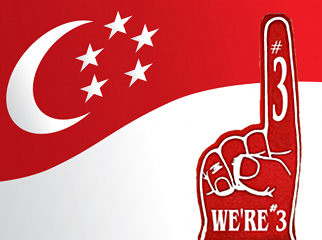 Singapore maintained its status as the world’s third-largest casino gambling hub in 2013, behind only Las Vegas and Macau. Singapore’s two integrated resort casinos – Las Vegas Sands’ Marina Bay Sands (MBS) and Genting Singapore’s Resorts World Sentosa (RWS) – saw their combined revenue rise 3.8% in 2013 to $6.08b, about half a billion shy of Las Vegas’ $6.5b tally and well off Macau’s record $45.2b haul. Sands’ MBS contributed $3.14b (+6.6%) to Singapore’s total, while RWS added $2.94b (+1%). The 3.8% increase was in line with Union Gaming Group analyst Grant Govertsen’s year-ago prediction of a rise “in the low or mid-single digit range” in 2013.
Singapore maintained its status as the world’s third-largest casino gambling hub in 2013, behind only Las Vegas and Macau. Singapore’s two integrated resort casinos – Las Vegas Sands’ Marina Bay Sands (MBS) and Genting Singapore’s Resorts World Sentosa (RWS) – saw their combined revenue rise 3.8% in 2013 to $6.08b, about half a billion shy of Las Vegas’ $6.5b tally and well off Macau’s record $45.2b haul. Sands’ MBS contributed $3.14b (+6.6%) to Singapore’s total, while RWS added $2.94b (+1%). The 3.8% increase was in line with Union Gaming Group analyst Grant Govertsen’s year-ago prediction of a rise “in the low or mid-single digit range” in 2013.
Singapore did set a record last year, but it was for the number of local residents declaring bankruptcy. The number of bankruptcies hit 1,992 in 2013, up a record 14% from 2012. Financial consultant Leong Sze Hian told the China Post that the effects of Singapore’s two resort casinos couldn’t be ruled out for helping to drive up the numbers, but the most recent statistics from Singapore’s Casino Regulatory Authority show that just 7.7% of Singaporeans had visited either casino since they opened in 2010 and RWS said in November that the number of locals passing through its turnstiles had fallen 15%. Far more likely culprits behind Singapore’s bankruptcy boom include a rising unemployment rate and higher costs facing small- and medium-sized businesses.
The costs of non-casino betting are also rising. On Friday, Deputy Prime Minister and Finance Minister Thearman Shanmugaratnam unveiled a raft of ‘sin tax’ increases, including a bump in duties on lottery betting such as that offered by Singapore Pools. The increase, which is effective immediately, boosts the betting duty from 25% to 30% and is expected to contribute a further S$255m (US $201m) to the government’s coffers this year. Also going up are taxes on liquor (+25%) and tobacco products (+10%), so not only are more people going bankrupt, but forgetting one’s sorrows with a stiff drink and a hit of nicotine is increasingly out of reach for cash-poor Singaporeans.






